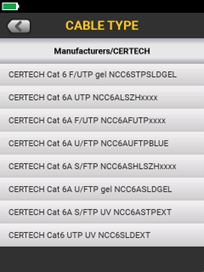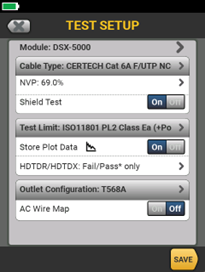Value of an Australian Structured Cabling Manufacturer being in the Fluke Tester?
CERTECH Cables in Fluke DSX5000 and DSX8000 Cable Testers
Authored by Wayne Allen (Independent Consultant and Fluke Networks Alumni)
Field testing is usually the last step in the installation of a high-quality structured data cabling solution. Your solution warranty usually depends on the test results submitted to the solution supplier, with 10, 15, 20, or more years of warranty being provided, the solution providers need to have confidence in the install before they sign off. More importantly, the bottom line for the installer is they do not usually get final payment until they submit those results. Yet, so often, it is in the field testing of an install where the most mistakes or errors are made. The biggest reason for field test results being rejected… incorrect tester setup!
CERTECH Certified Technologies as an Australian company and supplier of structured cabling solutions to many leading organisations is acutely aware of the need for high-quality and accurate test results. With a market-leading 25-year certified warranty program, quality and accurate test results play a major part in that program. Unfortunately, CERTECH has seen firsthand what poor field test results look like and the impact that can have on their customers, often the end user of the network.
CERTECH has taken the initiative to work with Fluke® to ensure test results for installs where CERTECH cables have been used are accurate and reflect the correct performance information around the structured cabling solution. Doing it right the first time gives the installer confidence in the solution they are delivering, the end user can have confidence in the installation they are paying for, and ensures CERTECH has the correct picture so that they can provide the market-leading certified 25-year warranty.
What are the benefits of partnering with Fluke?
Why partner with Fluke®? Fluke® is considered the world leader in the field of structured cabling certification; they have been doing it for nearly 30 years. The DSX® series of CableAnalyzers™ by Fluke Networks® is the most trusted tester worldwide, its results are accepted widely by leading structured cabling solution manufacturers.
Correct tester set up
The key to getting good, consistent test results is to set up a DSX Series CableAnalyser™ correctly.
Follow these easy steps.
- Set up the correct cable and NVP first,
- Select the correct test limit,
- Enter your cable IDs and you are ready to go.
Make sure your test limit is correct! The biggest mistake made! Australia uses ISO test limits, our structured cabling standard is the AS 11801 series, which has six parts. Today, remote powering always needs to be considered as many newer networking devices can use Power over Ethernet (PoE) as their power source rather than traditional mains power.
When setting up the correct test limit on a DSX CableAnalyzer™.
- Select the correct ISO class of cabling first,
- Select the correct link configuration, usually Permanent Link (PL2), and make sure you select a test limit with (+PoE) at the end. (This will ensure that the link will also be checked for its ability to carry PoE as well as data.)
Another key setup area often neglected is the correct selection of the cable being tested.
When setting up the correct cable type on a DSX CableAnalyzer™, follow these points.
- You choose the correct cable construction type, for example.
- U/UTP - Unshielded overall and Unshielded Twisted Pairs
- F/UTP - Foil shield overall and Unshielded Twisted Pairs
- U/FTP - Unshielded overall and Foil shielded Twisted Pairs
- S/FTP - Shield overall (braid or foil) and Foil shielded Twisted Pairs
- Select the correct NVP for the cable you are installing.
NVP or Nominal Velocity of Propagation, ensures the electrical length measurement is correct. Even though Length is not a pass/fail criterion (with ISO-based test limits we use Propagation Delay) it is a key data point for the certification of cabling for warranty. With longer runs, a wrong NVP setting can raise a red flag as the link length may appear longer than it really is. Take an 85m Cat 6A cable with an NVP of 69%, you incorrectly set the testers' NVP to 75%, the cable will show as 92.4m on the field tester. Submit test results with a 92.4m run and you will get some questions. If you are the installer, you could be asked to retest the whole installation as your supplied test data is incorrect.
Let’s look at that cost:
- 1000 outlets to be retested,
- Burdened labour rate of $100 per hour (to keep the numbers simple),
- Tester takes 10 seconds per test, plus time to move test lead connections around, say 20 seconds per test.
To retest, it will take 5.55 hours (((1000*20)/60)/60) * $100, $555.55 dollars later! OUCH! I just blew some of my profit margins… ☹ Do your own numbers…

Minimise the errors
To minimise the risk of errors when installing CERTECH cables, CERTECH has worked with Fluke Networks to have our cables added to Fluke’s Manufacturers Database within the DSX Series of CableAnalyzers. The screen capture to the left above shows the partial CERTECH Cable Database within a Fluke DSX Series CableAnalyzer. Select the correct cable type and the correct NVP value will be selected automatically ensuring correct testing. Above right is the correct test setup for a CERTECH Cat 6A F/UTP installed solution.
This is the value of an Australian company working with a leading test instrument manufacturer to ensure high-quality and accurate test results for easy warranty verification on structured cabling installations. Simplifying tester configuration for correct testing of all CERTECH Certified Technologies structured cabling solutions.


